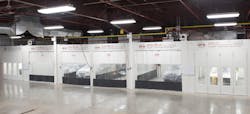Since multi-shop operations (MSOs) cover a large geographic area within a region, they often have good name recognition and do not lack for customers. And if they do great work, there is a higher potential for repeat business. MSOs are not all created equal, however.
MSOs with specialized shops—in which certain shops cater to different types of vehicles or perform specific services—have a leg up on their competition. Vehicles continue to become more custom and MSOs need to become more adept to keep up with demand. Most importantly, specialization helps MSOs maintain balanced workflow, improve efficiency and maximize labor in the name of increasing profitability.
The speed at which a vehicle is repaired by a shop impacts its length of rental (LOR) time—the measuring stick insurance and rental car companies use to judge collision repair facilities. An MSO with specialized shops is attractive to insurance companies, who typically pay more to shops performing quality work quickly.
By specializing your shops, you can better avoid slowdowns and prevent the work in progress (WIP) area from becoming too heavy in any one shop. For MSOs with at least three shops, repairs should be divided so that no one shop is overloaded when large jobs hit the shop floor. If vehicles are waiting to be painted, profit is not realized nearly as quickly and a shop’s LOR is negatively impacted.
With a nationwide shortage of qualified technicians, shop specialization enables MSOs to maximize productivity and better utilize the skill sets of their technicians. When a technician performs a large number of certain types of repairs, they become more skilled and efficient at that type of repair. Multiple technicians may combine to complete repairs rather than a single technician having to repair a vehicle from start to finish.
Shop specialization allows MSOs to position their best technicians to work on the most challenging repairs. With specialized shops, B- and C-level technicians can be utilized for small repairs, while A-level technicians focus on larger repairs. This makes it easier for MSOs to establish different pay structures for technicians; A-level technicians are typically paid on commission, and B- and C-level technicians are usually paid hourly, plus bonuses.
Specialized shops also offer MSO operators ways to better calculate labor efficiency, which is essential for accurately scheduling and forecasting. Specializing your shops also promotes a more balanced parts-to-labor ratio—used by managers to decide how much to charge for labor and parts.
Without specialized shops, MSOs often struggle with paint material profitability. In most cases, they are overspending on paint materials for small jobs (repairs that take only a few hours). When each location takes on a slew of small jobs, they must perform them fast or they are not likely to be profitable.
Click here to continue reading.
About the Author
Sponsored Content
The views and opinions expressed in this piece do not necessarily reflect those of 10 Missions Media and its associated brands.
